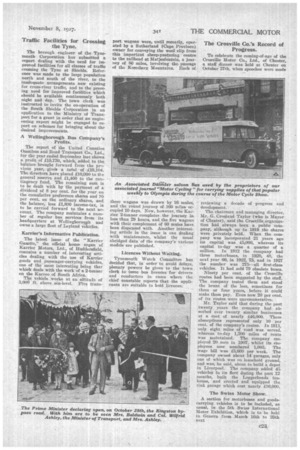Traffic Facilities for Crossing the Tyne.
Page 81

If you've noticed an error in this article please click here to report it so we can fix it.
The borough engineer of the Tynemouth Corporation has submitted a report dealing with the need for improved facilities for all classes of traffic crossing the Tyne at Shields. Reference was made to the large population north and south of the river, to the inadequate arrangements now existing for cross-river traffic, and to the pressing need for improved facilities which should be available continuously both night and day. The town clerk was instructed to invite the co-operation of the South Shields Corporation in an application to the Ministry of Transport for a grant in order that an engineering expert might be engaged to report on schemes for bringing about the desired improvements.
A Wellingborough Bus Company's Profits.
The report of the United Counties Omnibus and Road Transport Co., Ltd., for the year ended September last shows a profit of £18,720, which, added to the balance brought forward from the previpus year, give a total of £.19,104. The directors have placed £10,000 to the general reserve and £1,400 to the contingency fund. The remaining sum is to be dealt with by the payment of a dividend of 8 per cent, for the year on the cumulative preference shares and 10 per cent. on the ordinary shares, and the balance, less 11,800 income-tax, is to be carried forward to the next account. The company maintains a number of regular bus services from its headquarters at Wellingboroizgh and owns a large fleet of Leyland vehicles.
ICarrier's Informative Publication.
The latest issue of the " Karrier Gazette," the official house organ of Karrier Motors, Ltd., of Huddersfield, contains a number of interesting articles dealing with the use of Karrier goods and passenger-carrying vehicles, one of the most interesting being that whieb deals with the work of a 2-tonner on the Karroo of South Africa. The vehicle Works at an altitude of 3,000 ft. above sea-level. Five trans part wagons were, until recently, operated by a Sutherland (Cape Province) owner for conveying the wool clip from this important sheep-pasturing centre to the railhead at Matjesfontein, a journey of 80 miles, involving thu passage of the Kornsherg Mountains. Each of
•
these wagons was drawn by 16 mules, and the round journey of 160 miles occupied 10 days. Now, however, the Karrier 2-tonner completes the journey in less than 29 hours, and the five wagons with their complement of 80 mules have been dispensed with. Another interesting article in the issue is one dealing. with maintenance, whilst the usual abridged data -of the company's various models are published.
Licences Without Waiting.
Tynemouth Watch Committee has decided that, in order to avoid delays, plenary powers be given to the town clerk to issue bus licences for drivers and conductors in cases where the chief constable reports that the applicants are suitable to hold licences:
The Crosville Co.'s Record of Progress.
To celebrate the coming-of-age of the Crosville Motor Co., Ltd., of Chester, a staff dinner was held at Chester on October 27th, when apeeelies were made reviewing a decade of progress and development.
The chairman and managing director, Mr. G. Crosland Taylor (who is Mayor of Chester), said the Crosville. organization had always been a public company, although up to 1919 the shares were privately held. When the company was incorporated 21 years ago its capital was £5,000, whereas its capital to-day was a quarter of a million. In 1912 the company had three motorbuses, in 1920, 48, the next year 60, in 1922, 75, and in 1927 the number was 275—all first-class vehicles. It had sold 79 obsolete buses.
Ninety per cent. of the Crosville routes had been suggested by the. staff. The company tested them and stood the brunt of the loss, sometimes for three or four years, before it cOuld make them pay. Even now 20 per cent of its routes were unreinunerative.
Mr. Taylor said that during the past twenty years the company had absorbed over twenty similar businesses at a cost of. nearly £46,000. These absorptions represented only 10 per cent. of the company's routes. In 1911, only eight miles of road was served. whereas to-day 1,300 miles of route was maintained: The company employed 20 men in 1907, whilst its employees now numbered 1,003. The wage bill was £3,600 per week. The company owned about 14 garages, only one ofwhich was nu leasehold ground, and was, he said, about to build a depot in Liverpool. The company added 45 vehicles to its fleet during the past 12 months, built the Loggerheads teahouse, and erected and equipped the rink garage which cost nearly £16,000.
The Swiss Motor Show.
A section for motorbuses and goodscarrying vehicles is to be included, as usual, in the 5th Swiss International Motor Exhibition, which is to be held in Geneva from March 16th to 25th next




















































































































































































